The demand for trigger sprayers in Japan is projected to grow from USD 26.8 million in 2025 to USD 36.6 million by 2035, reflecting a CAGR of 3.2%. Trigger sprayers are widely used in industries such as cleaning, gardening, cosmetics, and household goods for dispensing liquids in a controlled, spray-like manner. As consumer preferences continue to evolve, the demand for innovative, ergonomic, and eco-friendly sprayer designs will contribute to market growth. The increased focus on sustainability and reducing plastic waste in packaging will also drive the demand for refillable trigger sprayers and biodegradable alternatives.
The market will be further fueled by advances in design and material innovations. For example, the adoption of trigger sprayers that are more durable, ergonomically designed, and cost-efficient will appeal to both consumers and businesses. Additionally, the growth of the cleaning products market, driven by both residential and commercial sectors, will significantly boost the demand for high-quality trigger sprayers in Japan.
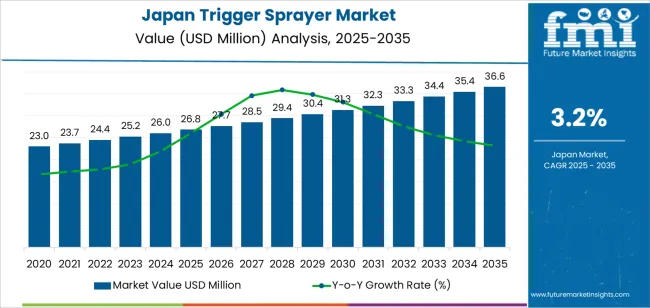
From 2025 to 2030, the demand for trigger sprayers in Japan will grow from USD 26.8 million to USD 31.3 million, contributing an increase of USD 4.5 million in value. The early growth phase will be characterized by a moderate acceleration driven by the increased adoption of spray products in cleaning, gardening solutions, and personal care applications. The expansion of eco-conscious and sustainable product lines will also support this early growth phase. The increase in demand will largely be driven by the consumer shift towards reusable packaging and refillable sprayers, as well as the growing emphasis on green products.
From 2030 to 2035, the market will grow from USD 31.3 million to USD 36.6 million, adding USD 5.3 million in value. This phase will show a slower growth rate as the market approaches saturation. The late-stage growth will be characterized by mature market conditions where the demand for trigger sprayers stabilizes. The growth rate will moderate as competition among manufacturers increases and the products become standard in many applications. Despite the slowing of acceleration, continued innovations in sustainability and efficiency will maintain steady demand, though at a more moderate pace compared to earlier growth.
| Metric | Value |
|---|---|
| Industry Sales Value (2025) | USD 26.8 million |
| Industry Forecast Value (2035) | USD 36.6 million |
| Industry Forecast CAGR (2025-2035) | 3.2% |
Demand for trigger sprayers in Japan is rising as producers of personal care, household cleaning and industrial maintenance products adopt more ergonomic, precise dispensing formats. The Japanese market for mini trigger pumps in cosmetic applications grew roughly 12 % year on year in 2018, according to industry analysis by Aerosol Industry Newspaper. Sales of standard sized trigger spray pumps also continued to grow.
Another factor influencing demand is increased consumer interest in hygiene, refillable packaging and compact product formats tailored to urban living environments. In Japan, brands emphasise aesthetics, quiet operation and ease of handling features which trigger sprayers support. On the supply side, Japanese manufacturing leaders in trigger pump mechanisms contribute to local availability and innovation potential. Challenges include pressure from alternative dispensing systems such as air less pumps, and raw material cost fluctuations. Nonetheless, the structural forces of packaging redesign, evolving consumer preferences and hygiene consciousness point to steady growth in the Japanese market for trigger sprayers.
The demand for trigger sprayers in Japan is primarily driven by product type and end-use segment. The leading product type is conventional trigger sprayers, which account for 36% of the market share, while home care is the dominant end-use, capturing 24.6% of the demand. Trigger sprayers are essential in various sectors, from household cleaning to personal care, and their demand continues to grow as industries seek efficient and cost-effective packaging solutions.
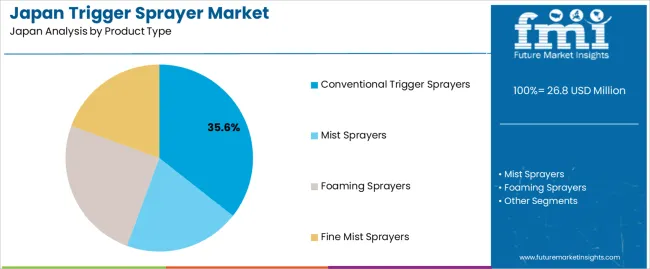
Conventional trigger sprayers lead the market for trigger sprayers in Japan, holding 36% of the demand. Conventional sprayers are widely used in cleaning products, air fresheners, and various household chemicals. They are valued for their ease of use, versatility, and ability to deliver consistent spray patterns, making them a reliable choice for both industrial and consumer applications.
The demand for conventional trigger sprayers is driven by their functionality and cost-effectiveness. As industries continue to prioritize efficient product delivery systems, these sprayers remain a popular choice for manufacturers, especially in the home care sector. Their widespread use in household cleaning products and personal care items ensures that conventional trigger sprayers will maintain their leadership in the market.
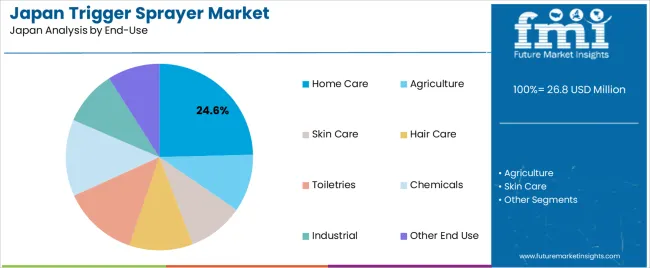
Home care is the leading end-use segment for trigger sprayers in Japan, accounting for 24.6% of the demand. In the home care sector, trigger sprayers are commonly used for packaging cleaning products, air fresheners, disinfectants, and other household chemicals. Their ability to deliver controlled spray volumes and distribute products evenly makes them a preferred choice in this market.
The demand from home care is driven by the increasing focus on convenient, efficient cleaning solutions that are easy to use and store. As consumer preferences shift towards more eco-friendly, sustainable products, trigger sprayers in the home care sector are expected to remain a dominant packaging solution. With continued growth in household cleaning and disinfecting products, home care will continue to be a key driver in the demand for trigger sprayers in Japan.
What Are the Primary Growth Drivers for Trigger Sprayer Demand in Japan?
Several factors support market growth. First, increasing demand for cleaning products, especially in post pandemic hygiene environments, fuels need for spray packaging formats. Second, the personal care category in Japan, including hair treatments, body sprays and sprayable cosmetics, is shifting toward trigger dispense formats for usability and dosing control. Third, single serve and refill friendly packaging models are rising in popularity among Japanese consumers, which supports trigger units designed for reuse. Fourth, e commerce and home delivery models in Japan increase the need for packaging solutions resilient to transit damage and customer handling, which augments trigger sprayer uptake.
What Are the Key Restraints Affecting Trigger Sprayer Demand in Japan?
Despite positive conditions, several constraints exist. First, the premium cost of high quality trigger mechanisms compared to simpler dispensing formats may deter smaller brand adoption in Japan’s competitive retail environment. Second, disassembly and recycling issues associated with multi component trigger units pose sustainability and regulatory challenges for Japanese converters focusing on closed loop packaging. Third, supply chain pressures such as resin price volatility and component toolings—can impede production scale up or delay launches. Fourth, some product categories in Japan may continue to favour alternative dispensers like pump or squeeze formats, which limits trigger sprayer penetration.
What Are the Key Trends Shaping Trigger Sprayer Demand in Japan?
Key trends include the growing use of trigger units made from recycled plastics and bio based materials, aligned with Japan’s circular economy initiatives. Trigger sprayer designs in Japan increasingly feature ergonomic nozzles, adjustable spray patterns and leak proof locking to meet consumer expectations for performance and durability. Another trend is the rise of refill and reuse formats in which the trigger unit is retained and only the bottle is replaced, supporting sustainability and cost savings. Additionally, packaging lines in Japan are moving toward standardised trigger units across formats (cleaning, personal care, garden) to streamline manufacturing and reduce inventory complexity.
The demand for trigger sprayers in Japan is driven by the increasing popularity of consumer products that require easy and effective dispensing, such as household cleaners, sanitizers, air fresheners, and personal care items. Trigger sprayers offer convenience, precision, and the ability to control the amount of product dispensed, which has made them a preferred choice for both consumers and manufacturers. The growing focus on hygiene, particularly in light of recent global health concerns, has further increased the demand for sprayers in cleaning and disinfecting products.
Additionally, the rising emphasis on sustainability and eco-friendly packaging solutions in Japan, combined with innovations in sprayer designs for durability and reduced environmental impact, has spurred the growth of the trigger sprayer market. Regional variations in demand reflect differences in industrial activity, consumer behavior, and regional manufacturing capacities.
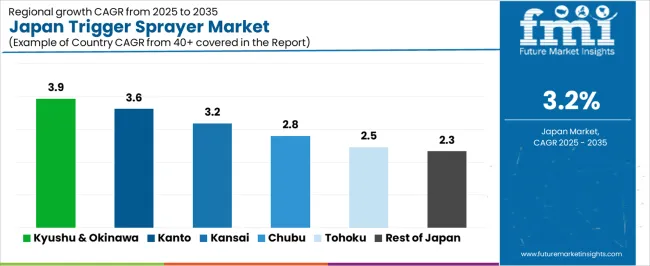
| Region | CAGR (2025 to 2035) |
|---|---|
| Kyushu & Okinawa | 3.9% |
| Kanto | 3.6% |
| Kinki | 3.2% |
| Chubu | 2.8% |
| Tohoku | 2.5% |
| Rest of Japan | 2.3% |
Kyushu & Okinawa leads the demand for trigger sprayers in Japan with a CAGR of 3.9%. This growth can be attributed to the region's significant agricultural and manufacturing base, where trigger sprayers are widely used for agricultural chemicals, pesticides, and other liquid products. Okinawa, with its tourism-driven economy, also plays a role in driving demand, as hotels and resorts use trigger sprayers for cleaning and sanitizing. Furthermore, the region's focus on environmental sustainability and eco-tourism has led to an increased preference for eco-friendly trigger sprayers.
As industries in Kyushu & Okinawa continue to modernize and adopt more efficient packaging solutions, the demand for trigger sprayers is expected to continue rising. The region’s push towards greener alternatives and effective product dispensing solutions further supports this trend.
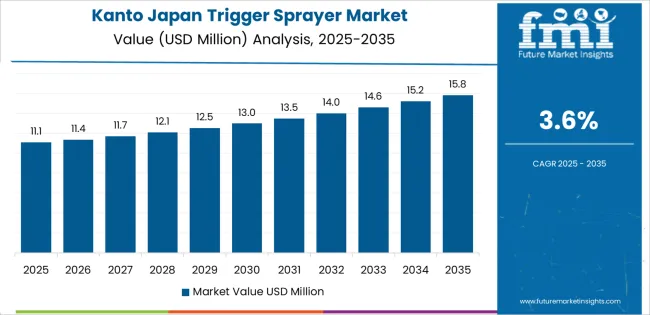
Kanto shows strong demand for trigger sprayers with a CAGR of 3.6%. As Japan’s most urbanized and economically developed region, Kanto, which includes Tokyo, has a large consumer base that uses household cleaning products, personal care items, and other consumer goods that require trigger sprayers. The region’s industrial base, which includes a concentration of manufacturing and retail companies, is also a key driver of demand for sprayers in various applications.
The growth in Kanto is driven by a combination of factors, including a rising awareness of hygiene and cleanliness, an increasing number of households adopting sustainable packaging solutions, and the demand for precision in product dispensing. As the demand for eco-friendly and efficient consumer products continues to rise, Kanto’s preference for high-quality and convenient trigger sprayers is expected to sustain strong growth in the market.
Kinki, with a CAGR of 3.2%, shows steady demand for trigger sprayers. The region, which includes Osaka, is a major industrial hub with a high concentration of manufacturing, retail, and consumer goods sectors. While the demand for trigger sprayers is not as high as in Kyushu & Okinawa or Kanto, it remains consistent due to the continued use of sprayers in cleaning products, personal care, and other consumer goods.
In Kinki, the demand is also influenced by the region’s focus on sustainability and environmental friendliness. As more businesses in Kinki seek to reduce their environmental impact, eco-friendly trigger sprayers are becoming increasingly popular. This steady demand is expected to continue, particularly as businesses and consumers in the region increasingly prioritize convenience and environmentally responsible packaging.
Chubu shows moderate growth in the demand for trigger sprayers with a CAGR of 2.8%. The region, known for its strong manufacturing sector, particularly in automotive and industrial products, also has a significant consumer goods sector that relies on sprayers for product dispensing. However, the growth rate in Chubu is slower compared to other regions, as the region is less focused on consumer products like household cleaners and personal care items, which are the primary drivers of trigger sprayer demand.
Nevertheless, as Chubu’s industries increasingly adopt sustainable packaging solutions and focus on reducing environmental impact, the demand for trigger sprayers is expected to grow steadily. The adoption of efficient, reusable, and eco-friendly products in the region will likely support moderate growth in this market.
Tohoku, with a CAGR of 2.5%, and the Rest of Japan, with a CAGR of 2.3%, show slower growth in the demand for trigger sprayers compared to more industrialized regions. These areas are typically less urbanized and have a lower concentration of industries that heavily rely on packaging solutions like trigger sprayers. However, both regions are experiencing gradual increases in demand as more consumer products, especially cleaning and personal care items, are being produced with eco-friendly packaging.
The slower growth can also be attributed to the more traditional approach to packaging and dispensing solutions in these regions. However, as awareness of environmental issues increases and consumer preferences shift toward sustainable, user-friendly products, the adoption of trigger sprayers in these areas is expected to increase, albeit at a more gradual pace.
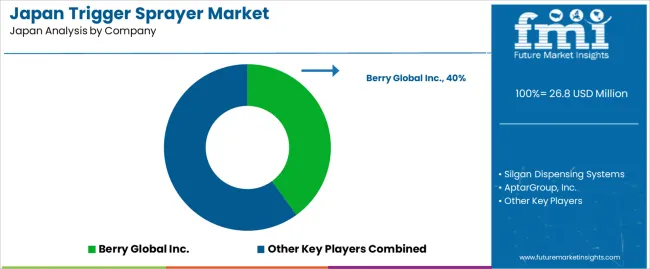
The trigger sprayer industry in Japan is being driven by demand from household cleaning, personal care and industrial liquid dispensing sectors, where ease of use and performance are key. Companies such as Berry Global Inc. (holding approximately 40% market share), Silgan Dispensing Systems, AptarGroup Inc., Mr. Nozzle Inc., Cole Parmer Instrument Company LLC and Frapak are prominent suppliers. Japanese manufacturers seek sprayers that offer consistent spray patterns, leak resistance and compatibility with a wide range of container types.
Competition in this industry hinges on design innovation, material selection and sustainability credentials. Suppliers focus on ergonomic trigger mechanisms, variable flow option and durability to withstand repeated use. Another competitive aspect is the shift towards recyclable or bio based plastics, reflecting environmental concerns and regulatory trends in Japan. Companies also emphasise supply chain responsiveness and packaging line integration, helping domestic fillers maintain efficient operations. Brochures typically highlight spray coverage, compatibility with cleaning agents or cosmetic formulas, trigger life cycles and material composition. Firms addressing these attributes can strengthen their presence in Japan’s trigger sprayer industry.
| Items | Details |
|---|---|
| Quantitative Units | USD Million |
| Regions Covered | Japan |
| Product Type | Conventional Trigger Sprayers, Mist Sprayers, Foaming Sprayers, Fine Mist Sprayers |
| End-Use | Home Care, Agriculture, Skin Care, Hair Care, Toiletries, Chemicals, Industrial, Other End Use |
| Neck Size | 28/400, 28/410, 20/410, 24/410, 24/415, 38/400, Others |
| Material Type | Polyethylene, Polypropylene, Polyethylene Terephthalate, Polyvinyl Chloride, Glass, Other Material Type |
| Key Companies Profiled | Berry Global Inc., Silgan Dispensing Systems, AptarGroup, Inc., Mr. Nozzle Inc., Cole-Parmer Instrument Company, LLC., Frapak |
| Additional Attributes | The market analysis includes dollar sales by product type, end-use, neck size, and material type categories. It also covers regional demand trends in Japan, driven by the increasing demand for trigger sprayers across home care, agriculture, and personal care industries. The competitive landscape highlights key players focusing on innovations in sprayer design, material selection, and functionality. Trends in the growing demand for eco-friendly materials and the adoption of trigger sprayers for industrial and chemical applications are explored, along with advancements in sprayer technologies. |
The demand for trigger sprayer in japan is estimated to be valued at USD 26.8 million in 2025.
The market size for the trigger sprayer in japan is projected to reach USD 36.6 million by 2035.
The demand for trigger sprayer in japan is expected to grow at a 3.2% CAGR between 2025 and 2035.
The key product types in trigger sprayer in japan are conventional trigger sprayers, mist sprayers, foaming sprayers and fine mist sprayers.
In terms of end-use, home care segment is expected to command 24.6% share in the trigger sprayer in japan in 2025.






Our Research Products

The "Full Research Suite" delivers actionable market intel, deep dives on markets or technologies, so clients act faster, cut risk, and unlock growth.

The Leaderboard benchmarks and ranks top vendors, classifying them as Established Leaders, Leading Challengers, or Disruptors & Challengers.

Locates where complements amplify value and substitutes erode it, forecasting net impact by horizon

We deliver granular, decision-grade intel: market sizing, 5-year forecasts, pricing, adoption, usage, revenue, and operational KPIs—plus competitor tracking, regulation, and value chains—across 60 countries broadly.

Spot the shifts before they hit your P&L. We track inflection points, adoption curves, pricing moves, and ecosystem plays to show where demand is heading, why it is changing, and what to do next across high-growth markets and disruptive tech

Real-time reads of user behavior. We track shifting priorities, perceptions of today’s and next-gen services, and provider experience, then pace how fast tech moves from trial to adoption, blending buyer, consumer, and channel inputs with social signals (#WhySwitch, #UX).

Partner with our analyst team to build a custom report designed around your business priorities. From analysing market trends to assessing competitors or crafting bespoke datasets, we tailor insights to your needs.
Supplier Intelligence
Discovery & Profiling
Capacity & Footprint
Performance & Risk
Compliance & Governance
Commercial Readiness
Who Supplies Whom
Scorecards & Shortlists
Playbooks & Docs
Category Intelligence
Definition & Scope
Demand & Use Cases
Cost Drivers
Market Structure
Supply Chain Map
Trade & Policy
Operating Norms
Deliverables
Buyer Intelligence
Account Basics
Spend & Scope
Procurement Model
Vendor Requirements
Terms & Policies
Entry Strategy
Pain Points & Triggers
Outputs
Pricing Analysis
Benchmarks
Trends
Should-Cost
Indexation
Landed Cost
Commercial Terms
Deliverables
Brand Analysis
Positioning & Value Prop
Share & Presence
Customer Evidence
Go-to-Market
Digital & Reputation
Compliance & Trust
KPIs & Gaps
Outputs
Full Research Suite comprises of:
Market outlook & trends analysis
Interviews & case studies
Strategic recommendations
Vendor profiles & capabilities analysis
5-year forecasts
8 regions and 60+ country-level data splits
Market segment data splits
12 months of continuous data updates
DELIVERED AS:
PDF EXCEL ONLINE
Trigger Sprayer Market Growth – Trends & Forecast 2025-2035
Demand for Trigger Sprayer in USA Size and Share Forecast Outlook 2025 to 2035
Japan Faith-based Tourism Market Size and Share Forecast Outlook 2025 to 2035
Japan Sports Tourism Market Size and Share Forecast Outlook 2025 to 2035
Japan Respiratory Inhaler Devices Market Size and Share Forecast Outlook 2025 to 2035
Japan Halal Tourism Market Size and Share Forecast Outlook 2025 to 2035
Japan Automated People Mover Industry Size and Share Forecast Outlook 2025 to 2035
Japan Automotive Load Floor Industry Analysis Size and Share Forecast Outlook 2025 to 2035
Japan Food Cling Film Market Size and Share Forecast Outlook 2025 to 2035
Japan Polypropylene Packaging Films Market Size and Share Forecast Outlook 2025 to 2035
Trigger Spray Bottle Market Size, Share & Forecast 2025 to 2035
Japan Probiotic Yogurt Market is segmented by product type, source type, nature type, flavor type, fat content, sales channel and key city/province through 2025 to 2035.
japan Tortilla Market - Growth, Trends and Forecast from 2025 to 2035
Japan Cosmetics ODM Market Analysis - Size, Share & Trends 2025 to 2035
Japan Automotive Turbocharger Market Insights – Demand, Size & Industry Trends 2025–2035
Japan Yeast Market Insights – Demand, Size & Industry Trends 2025–2035
Japan Green and Bio-based Polyol Market Insights – Demand, Size & Industry Trends 2025–2035
Japan Natural Food Color Market Trends – Growth, Demand & Forecast 2025–2035
Japan Coated Fabrics Market Growth – Trends, Demand & Innovations 2025–2035
Japan Barite Market Growth – Trends, Demand & Innovations 2025–2035

Thank you!
You will receive an email from our Business Development Manager. Please be sure to check your SPAM/JUNK folder too.
Chat With
MaRIA